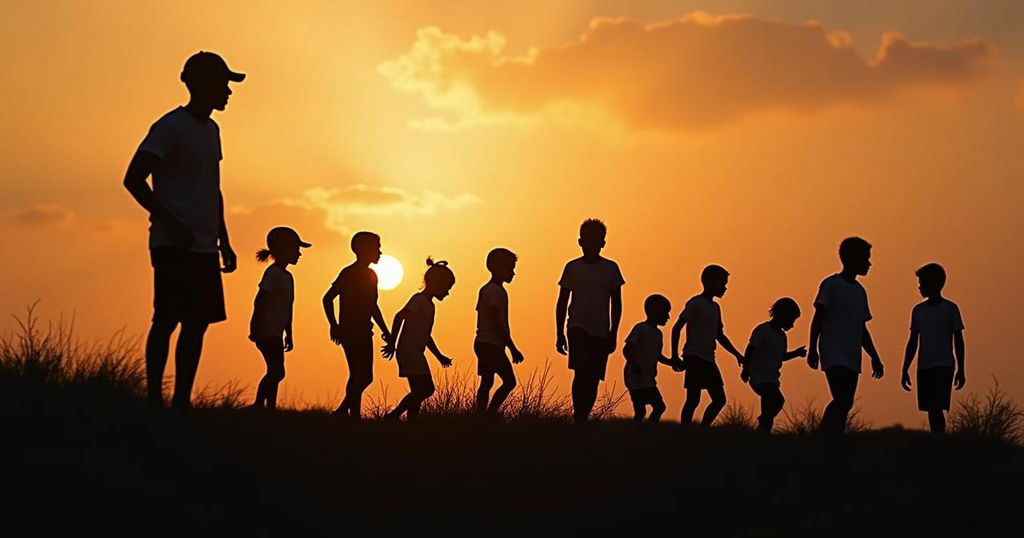Dominican Republic Announces Plans to Expel Haitian Migrants Amid Humanitarian Crisis
The Dominican Republic plans to expel up to 10,000 Haitian migrants weekly, despite UN warnings against forced returns due to escalating gang violence in Haiti. The situation has led to a humanitarian crisis, with significant loss of life and high levels of displacement and hunger in Haiti. Rights groups have condemned these expulsions as racially discriminatory, while the Dominican government defends its actions citing a lack of international response to the crisis.
The Dominican Republic has announced plans to expel as many as 10,000 Haitian migrants per week, despite warnings from the United Nations against repatriating individuals to Haiti amidst escalating gang violence. This decision was communicated by Homero Figueroa, a spokesman for the Dominican presidency, who noted that the operation aims to address the excessive number of migrants present in Dominican communities. The expulsions are expected to commence immediately. The UN has reported alarming statistics concerning violence in Haiti, with at least 3,661 fatalities attributed to gang violence during the first half of 2024. The situation in Haiti remains dire, with over 700,000 individuals internally displaced and more than half of the population—over 5.4 million people—facing acute hunger. Moreover, recent developments have seen armed groups, often connected to Haitian political and business leaders, exerting control over 80 percent of Port-au-Prince. In response to the perceived inadequacy of international assistance in stabilizing Haiti, Dominican President Luis Abinader has criticized global inaction, stating, “We warned at the UN that either it and all the countries that had committed themselves [to helping Haiti] act responsibly in Haiti, or we will.” This stringent immigration policy reflects Abinader’s broader approach, which has already seen 250,000 undocumented Haitians expelled in 2023 alone. Rights organizations have condemned these actions, arguing that they represent a racially discriminatory immigration strategy and reflect historical anti-Haitian sentiments in the Dominican Republic. Critics suggest that these expulsions often disproportionately affect individuals who appear to be Haitian, further exacerbating fears of racial profiling. The UN’s refugee agency has urged nations worldwide to refrain from deporting Haitians back to their country, emphasizing the urgency of protecting those in need of international refuge given the escalating violence and human rights violations. Haitian leaders have also indicated that they are struggling to combat these violent armed groups, highlighting the profound insecurity in the nation. These developments come at a time of profound turmoil in Haiti and signal a complex set of moral and humanitarian challenges for the Dominican Republic and the broader international community regarding the treatment of Haitian migrants amid this escalating crisis.
The situation in Haiti has been critically unstable for years, worsened by rampant gang violence, political turmoil, and humanitarian crises. The country faces significant challenges, including high levels of hunger and displacement, exacerbated by the activities of armed groups. The Dominican Republic shares a border with Haiti, making it one of the primary destinations for Haitian migrants fleeing violence and seeking refuge. However, recent Dominican government policies have increasingly adopted a hardline stance on immigration, especially towards Haitians, leading to a wave of deportations amid international calls for protection and assistance for those fleeing oppression in their home country. The actions taken by the Dominican Republic reflect a complex interplay of national security concerns and humanitarian responsibilities on an international scale.
In conclusion, the Dominican Republic’s intention to expel up to 10,000 Haitian migrants weekly amidst an ongoing humanitarian crisis in Haiti raises significant ethical and human rights concerns. The warnings from the UN and various human rights organizations accentuate the dire implications of such actions, highlighting a conflict between national policy and international obligations. As the situation continues to unfold, the global community must advocate for the protection of vulnerable populations while addressing the systemic issues that drive migration.
Original Source: www.aljazeera.com




Post Comment